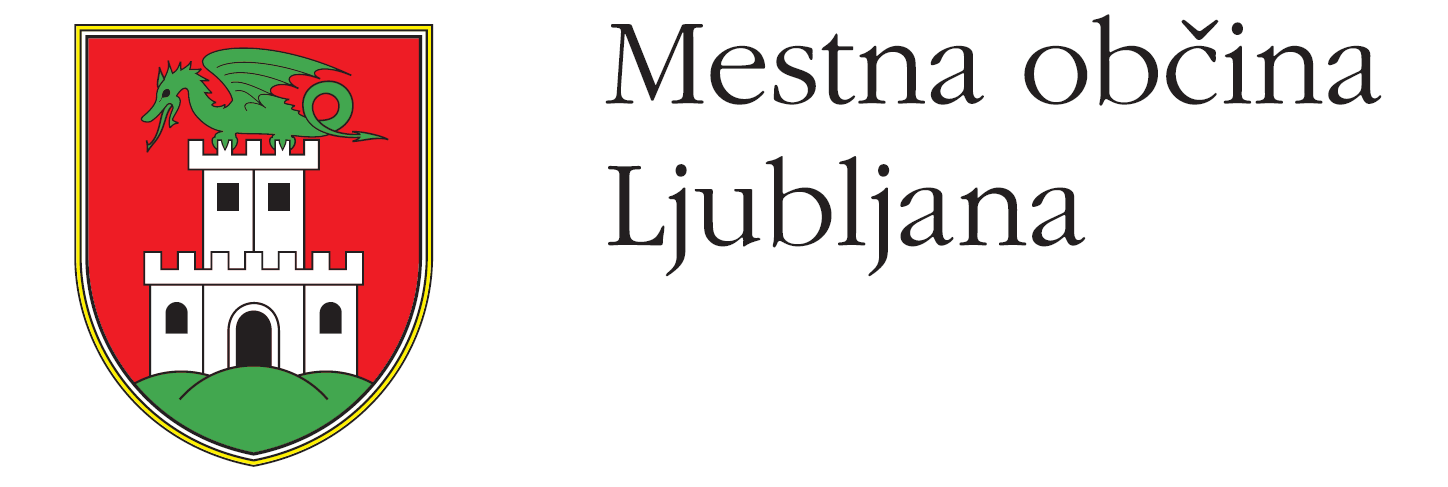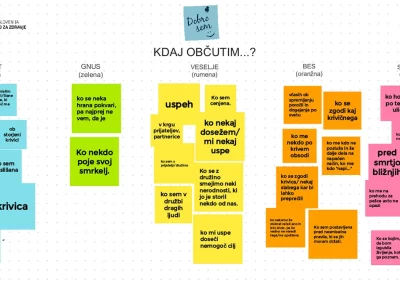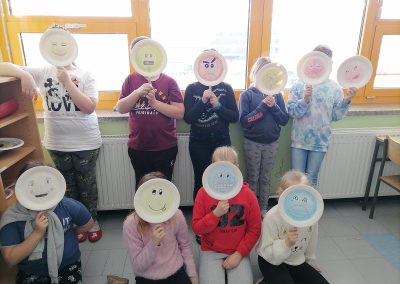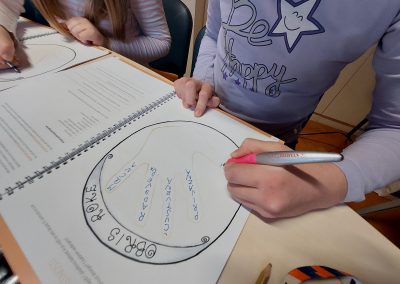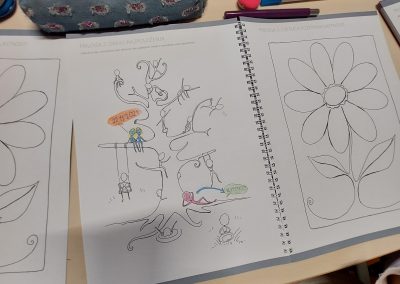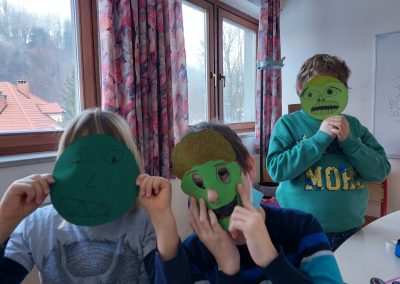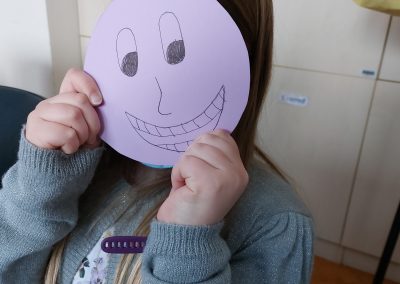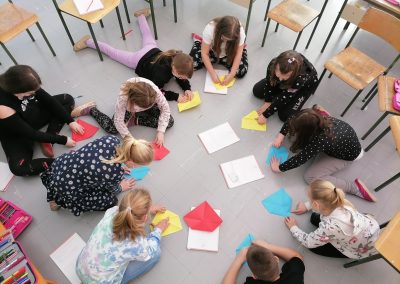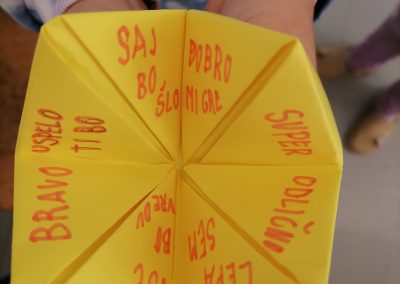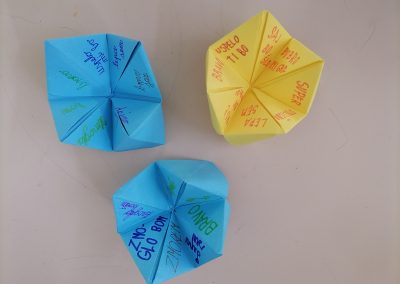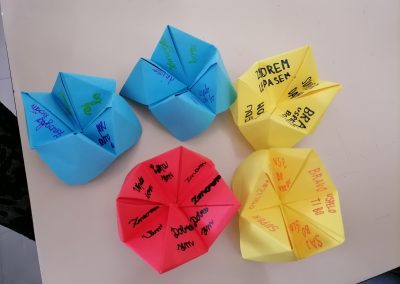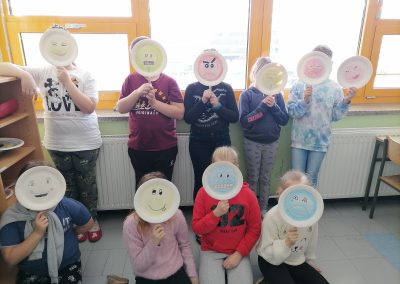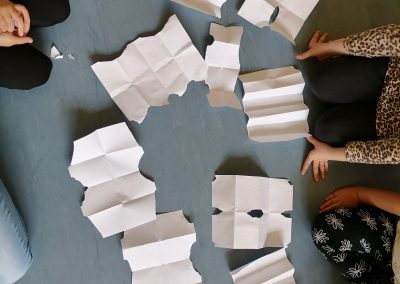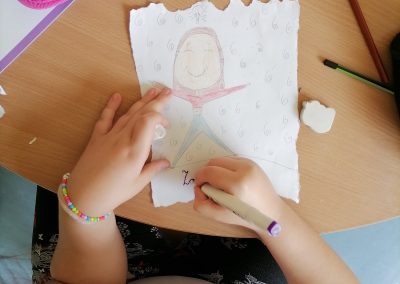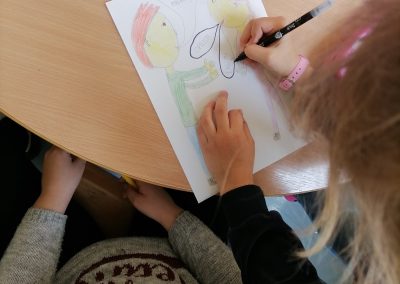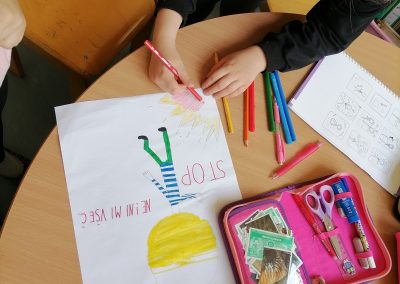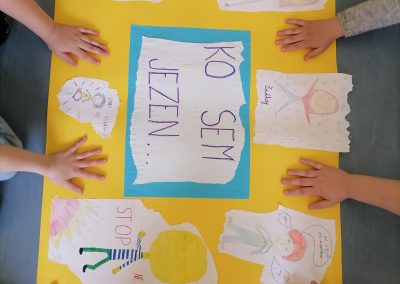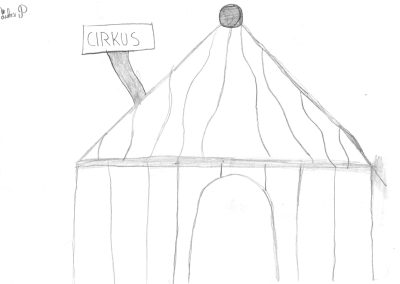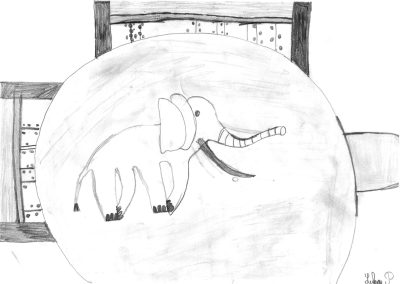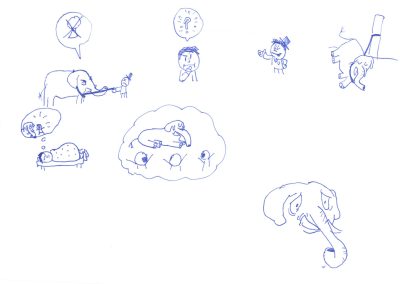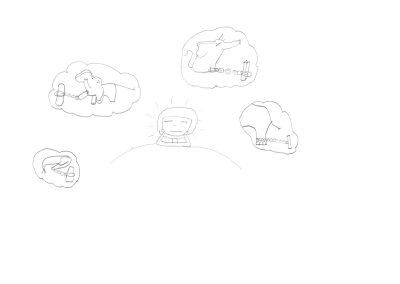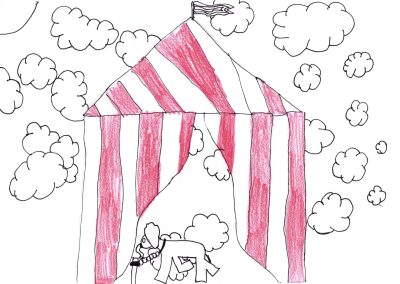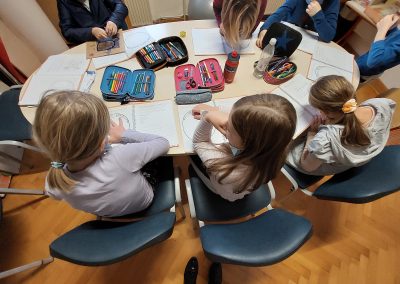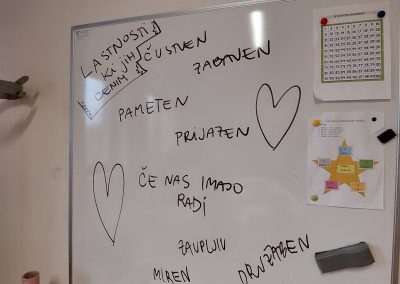Dobro sem
What is the Dobro sem program?
The “DOBRO SEM” (Eng. I am well/I am allright) program is a preventive mental health program for vulnerable groups, operating under the auspices of the Anita Ogulin Association & ZPM. The program offers free training for individuals who wish to conduct mental health workshops with vulnerable groups in their local communities.
Mental health is not only essential for physical well-being but also enables functioning on emotional, cognitive, and social levels. It manifests in vitality, strength, motivation for work, healthy interpersonal relationships, and the ability to handle daily stress and challenges. Mental health impacts an individual’s thinking, communication, connection with others, learning, and personal growth. It means greater adaptability, resourcefulness, and resilience in the face of difficulties or unpleasant events.
Through the “DOBRO SEM” program, we help participants build psychological resilience and increase access to preventive mental health support.
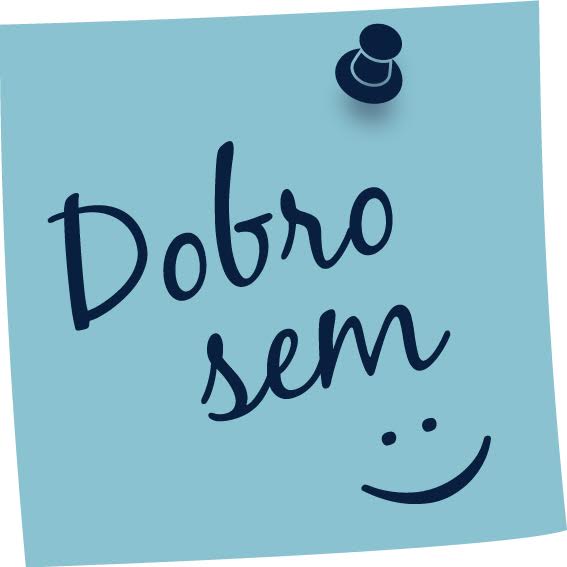
PROGRAM OPERATION
The program offers:
- Free training for individuals who wish to run workshops;
- Free materials for implementation, provided to each trained individual, which include:
- A trainer’s manual with theoretical backgrounds, workshop content, and instructions for implementation;
- Materials for workshop participants to use during sessions and keep afterward (workbook or worksheets);
- Professional mentorship support during workshop delivery.
WHO ARE THE WORKSHOP CONTENTS FOR?
The “DOBRO SEM” program offers training in three modules:
- Adults (18+);
- Children aged 6 to 12;
- Adolescents aged 13 to 18.
Participants may choose training based on the target group they wish to work with. While the workshop content is similar across modules, it is adapted to the developmental stage and specific needs of each group.
DOBRO SEM TRAINING
“DOBRO SEM” training lasts one calendar year and is divided into three parts:
- CONTENT FAMILIARIZATION
Participants learn the workshop content, theoretical background, and methods of delivery. They receive all necessary implementation instructions, examples of good practices, suggestions for adaptation, and reporting guidelines.
- PRACTICAL TRAINING
After part one, each participant has one year to conduct a full workshop cycle with their chosen target group in their local area. They receive free materials and ongoing mentor support from program staff.
- FINAL MEETING
About one year later, we hold a virtual closing meeting to share experiences, resolve issues, and conclude the training.
After completing the training, each trainer receives a certificate and may independently lead workshops.
| E-mail address | dobro.sem@zveza-anitaogulin.si |
| Phone number |
FAQs
How can I get involved in the Dobro sem program?
Through the Dobro sem program, we offer free training sessions for individuals who wish to conduct mental health promotion workshops for children and/or adults in their local environment. We publish information about upcoming trainings on our website, on our Facebook profile and in a monthly newsletter, which you can subscribe to here. When training sessions are scheduled, we post a link to the online application on our website. After completing the training, you will receive a certificate and can start conducting workshops.
How does the Dobro sem training work?
The training takes place in three phases: the theoretical part, the practical part (independently conducting workshops) and the final meeting (remotely), and lasts for about one calendar year. The successful completion of the training is considered if you complete all three phases of the training.
Will we receive a certificate that we have completed the training sessions?
Yes. Each participant who completes the training will receive a certificate of completion and the “Dobro sem Trainer” title.
Do I need to pay for the training and materials?
No. Training and workshop materials are free of charge for all.
Where can I conduct workshops?
Workshops can be carried out anywhere. All you need is a suitable space and a group of people to visit them. Trainers usually carry out workshops at primary and secondary schools, in high school dormitories, at social work centres, in public local premises (libraries, multi-generational and youth centres) and the like.
I have completed the training and would like to start conducting the workshops. What should I do next?
Any trainer who wishes to conduct workshops must inform us by sending us an e-mail to dobro.sem@zveza-anitaogulin.si.It is a good idea to know where you intend to perform your workshops and with which target group. You must first sign an agreement on volunteer work with us, after which you will receive all the necessary material for the implementation and instructions for reporting on the implementation of workshops.
Is there a time limit within which I have to perform the workshops?
After completing the training, you can start conducting workshops. It is recommended that workshops are conducted continuously once a week (for 12 consecutive weeks of two hours for adults and for 10 consecutive weeks of an hour and a half for children and adolescents). Of course, there may be deviations due to holidays, sick leaves or something else, and this may also delay implementation. If you are concerned about the timing of the workshops, you can also contact us at dobro.sem@zveza-anitaogulin.si and we will advise you on the best way to plan them based on our experience.
Is it necessary to carry out the workshops in order or can I choose the order myself?
In principle, it is recommended that the workshops are carried out in order, as they are designed to connect and upgrade each other.
Is there a limit to how many participants can attend the workshops?
There is no limit on the number of participants in the workshops. Based on the experience of our trainers, we find that the most optimal number is between 8 and 12 participants. However, many trainers also carry out workshops with larger groups – especially in the school environment, where they carry them out with the entire class. If the number of participants is higher, it is important that these participants already know each other from before, as this makes it easier to create a relaxed and confidential atmosphere and to conduct workshops.
Do the workshops always have to be attended by the same participants?
Yes. The workshops are intended for closed groups, as it is extremely important to create a safe and relaxed climate in the group. In addition, the workshops are designed in such a way that each participant should receive the content of all workshops. Participants reinforce their mental health through exercises, which often encourages them to share personal hardships and problems with the group, so it is important that they feel safe and accepted in the group, which can only happen if the group is closed and if its participants remain the same.
Is it possible to conduct workshops remotely?
No. We do not support the implementation of remote workshops, as one of the main purposes of workshops (in addition to strengthening mental health) is also to promote social interaction between participants. The workshops are based on group dynamics, and the exercises performed by the participants are designed in such a way that they cannot be performed remotely.
Can I carry out the workshops as part of my employment?
Of course, you can easily carry out the workshops as part of your employment – in this case, you arrange for the implementation yourself, with your co-workers or superiors.
What can I do if I find myself in a bind during the workshops?
We are always available to all trainers for any questions and possible dilemmas when it comes to implementing their workshops. If you find yourself in a tricky situation, contact us by e-mail or call us and we will help you.
Can the workshops be carried out simultaneously by two trainers?
Of course. Workshops can also be carried out in pairs, but it is recommended that both trainers are present at all workshops (with the exception of unforeseen absences), as the constant change of trainers can negatively affect the group dynamics and the sense of safety of the participants.
I have completed my training for trainers and would now like to conduct workshops alongside someone who has not completed their training. Is this possible?
If you want to conduct the workshops with someone who has not completed the training, please let us know by sending us an e-mail at dobro.sem@zveza-anitaogulin.si. A trainer who has received training can train someone else by conducting workshops together. In this case, the unqualified trainer must be present at all workshops, and both trainers must then complete some additional documentation. After the workshops, it is considered that the new trainer has completed the training and receives a certificate, which means that they can also carry out the workshops independently.
Is it necessary to perform all the exercises during one workshop?
Each workshop consists of several exercises that you perform with the workshop participants. Since the groups of participants differ from each other (due to their age, interests, needs, levels of understanding), it is not necessary to perform all the exercises listed for each workshop. You can decide which exercises you will perform during the workshop at your own discretion, so that you can adapt the workshops to the needs of your participants to the broadest extent possible.
Do I need to write a report on the implementation of the workshops?
Yes. Due to the needs of the tender and the monitoring of the implementation of the workshops, each trainer must keep a record of the attendance of participants and a log of volunteer work during the implementation of the workshops; after the workshops are completed, they must prepare a short report on the implementation of the workshops and the evaluation of the participants (this is done through the online forms that we provide at the end of the workshops).
Do the participants receive any certificates confirming they attended the workshops?
Yes. If necessary, we can issue participants with a certificate of participation in workshops, and they must have participated in at least 80% of the workshops in order to obtain this certificate. If you wish to receive certificates for your participants, please let us know at dobro.sem@zveza-anitaogulin.si.
Do I receive a certificate if I conducted workshops?
Yes. Each trainer who conducts workshops and arranges all the necessary documentation receives a certificate of conducted workshops.
Can I perform my training and the workshops in exchange for points in terms of promotion as part of my employment?
Unfortunately, the implementation of the “I’m Alright” programme is not evaluated through points that could be used by an employee for their promotion.
Will you reimburse me for any costs as part of my volunteer work?
If you incur any additional transport costs due to your workshops, we will pay your travel expenses amounting to the cheapest route, for which we must receive a completed volunteer log (“travel expenses” category). In the event that you carry out the workshops as part of your employment, you are not entitled to reimbursement of travel expenses.
Reactions of our trainers
REACTIONS OF PARTICIPANTS
The project is co-financed by the Ministry of Health within the framework of the Public tender for co-financing programmes for the protection and strengthening of health until 2025. In the period 2024 – 2026, it is also supported by the City of Ljubljana.

